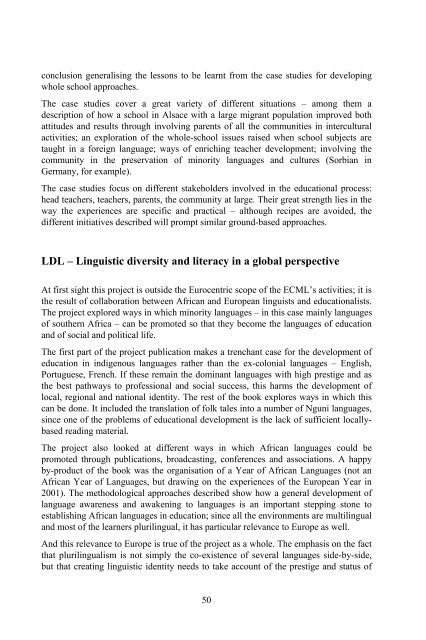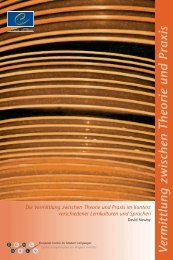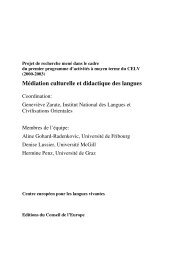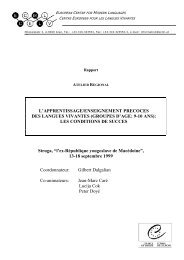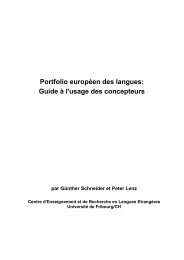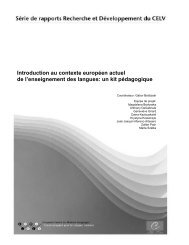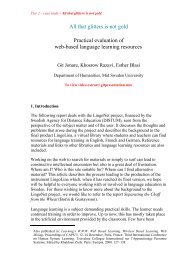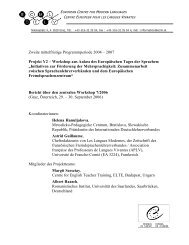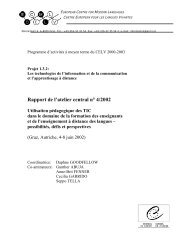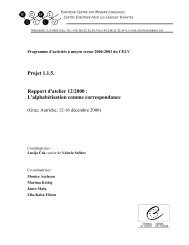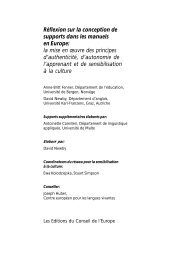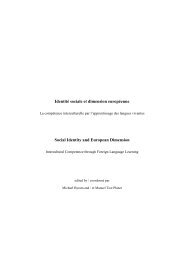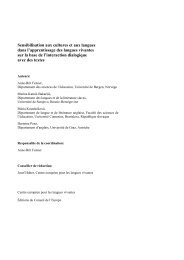cohesion - European Centre for Modern Languages
cohesion - European Centre for Modern Languages
cohesion - European Centre for Modern Languages
Create successful ePaper yourself
Turn your PDF publications into a flip-book with our unique Google optimized e-Paper software.
conclusion generalising the lessons to be learnt from the case studies <strong>for</strong> developing<br />
whole school approaches.<br />
The case studies cover a great variety of different situations – among them a<br />
description of how a school in Alsace with a large migrant population improved both<br />
attitudes and results through involving parents of all the communities in intercultural<br />
activities; an exploration of the whole-school issues raised when school subjects are<br />
taught in a <strong>for</strong>eign language; ways of enriching teacher development; involving the<br />
community in the preservation of minority languages and cultures (Sorbian in<br />
Germany, <strong>for</strong> example).<br />
The case studies focus on different stakeholders involved in the educational process:<br />
head teachers, teachers, parents, the community at large. Their great strength lies in the<br />
way the experiences are specific and practical – although recipes are avoided, the<br />
different initiatives described will prompt similar ground-based approaches.<br />
LDL – Linguistic diversity and literacy in a global perspective<br />
At first sight this project is outside the Eurocentric scope of the ECML’s activities; it is<br />
the result of collaboration between African and <strong>European</strong> linguists and educationalists.<br />
The project explored ways in which minority languages – in this case mainly languages<br />
of southern Africa – can be promoted so that they become the languages of education<br />
and of social and political life.<br />
The first part of the project publication makes a trenchant case <strong>for</strong> the development of<br />
education in indigenous languages rather than the ex-colonial languages – English,<br />
Portuguese, French. If these remain the dominant languages with high prestige and as<br />
the best pathways to professional and social success, this harms the development of<br />
local, regional and national identity. The rest of the book explores ways in which this<br />
can be done. It included the translation of folk tales into a number of Nguni languages,<br />
since one of the problems of educational development is the lack of sufficient locallybased<br />
reading material.<br />
The project also looked at different ways in which African languages could be<br />
promoted through publications, broadcasting, conferences and associations. A happy<br />
by-product of the book was the organisation of a Year of African <strong>Languages</strong> (not an<br />
African Year of <strong>Languages</strong>, but drawing on the experiences of the <strong>European</strong> Year in<br />
2001). The methodological approaches described show how a general development of<br />
language awareness and awakening to languages is an important stepping stone to<br />
establishing African languages in education; since all the environments are multilingual<br />
and most of the learners plurilingual, it has particular relevance to Europe as well.<br />
And this relevance to Europe is true of the project as a whole. The emphasis on the fact<br />
that plurilingualism is not simply the co-existence of several languages side-by-side,<br />
but that creating linguistic identity needs to take account of the prestige and status of<br />
50


